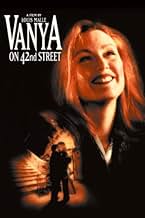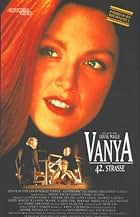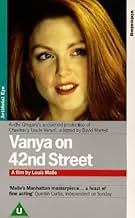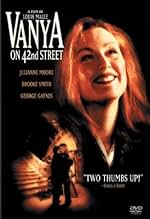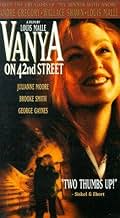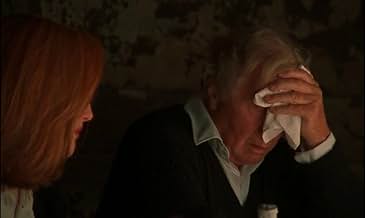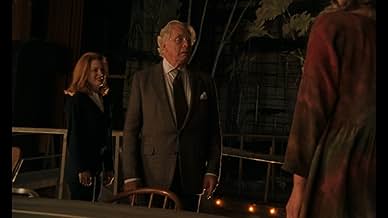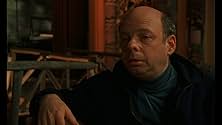IMDb RATING
7.3/10
5.5K
YOUR RATING
New York actors rehearse Chekhov's "Uncle Vanya" in a dilapidated theatre.New York actors rehearse Chekhov's "Uncle Vanya" in a dilapidated theatre.New York actors rehearse Chekhov's "Uncle Vanya" in a dilapidated theatre.
- Director
- Writers
- Stars
- Awards
- 3 wins & 13 nominations total
- Director
- Writers
- All cast & crew
- Production, box office & more at IMDbPro
Featured reviews
10Jack-196
Vanya is one of my favorite plays. Have seen it several times--stage, movies, television. This is far and away the best production I've seen. Incredible performances. I was afraid the frame of a rehearsal, and the bare stage would get in the way. They did not. Actors doing Chekhov usually seem to be more like actors than people. This cast was completely believable as real people(ironically, set and "costumes" may actually have helped here). Don't know Brooke Smith or Larry Pine, but they should be getting good roles. Wasn't a Julianne Moore fan, but I am now. Never saw Shawn in a sustained role except "My Dinner with Andre".He was perfect.Malle used camera extremely well, but did not "open up" the play to irrelevant cinematic expansion. Vanya was BOTH a film and a play without sacrificing one to the other. Making it work as both was quite an accomplishment.
This is a beautiful inquiry into the human condition. If you doubt that Chekhov was a brilliant writer, then this will be your gateway to excellence. The movie sports a wonderful cast while supposedly filmed during a dress-rehearsal. This is truly a movie to watch when in a serious and reflective mood, but despite such, it is a must see and an insightful gift from a phenomenal writer.
Like many slice of life films, this explores the hearts of the characters. Their desires and dreams, like many of us, do not reflect what becomes of their lives. Thus a questioning must occur. Am I dealt this hand or could I have been more?
If you like slice of life films, this is a must see.
Like many slice of life films, this explores the hearts of the characters. Their desires and dreams, like many of us, do not reflect what becomes of their lives. Thus a questioning must occur. Am I dealt this hand or could I have been more?
If you like slice of life films, this is a must see.
There's no shortage of intelligent work in film. But here we have one of the most complexly referential things I've ever seen. Simple self-reference points to itself. Common self-reference points to the viewer defining the experience.
But Mingus used to say why have three threads when you can have seven? Here, some of the most adventurous thinkers in film give us four threads, actually four and a half.
We have the Chekhov play and the Mamet wrapping. Make no mistake that this is not an editing or a translation, but an annotation. We have two perspectives simultaneously. Add to that the notion of the play not as a play for an audience as intended, but an event conducted regularly by the performers for their own sake. This is a creation orchestrated by Gregory, the third thread. One can clearly see in some scenes neither Chekhov nor Mamet but artists collaborating in dialogs. The inner eyes and the outer eyes differ.
Fourth, we have Malle's creation which introduces us into the equation with deliberately shaky and sometimes misframed camerawork. We aren't part of any prior experience, but the actors do include the camera in their collaboration, as an independent thread. Watch how Andre works the camera.
And finally, we have the framing of the artists in real life. This is not simultaneous with the others and in any case excludes the filmmaker.
I recall seeing Paul Newman in the Color of Money in the first scene, acting on three levels simultaneously. It took my breath away. Here, the purpose of the whole contrivance is to challenge the actors (and the viewers!) to participate in a jazz ensemble of acting where the layer of reality is constantly shifting. They chose Uncle Vanya as the base for a reason, because his evershifting foci of love and hate in pairs provide cues for levelshifting.
Shawn really plays on this. His skill wasn't apparent to me on first viewing, especially in the first scenes, where all players are on stage and the non-focus actors have to be invisible. But on repeated viewings one can see his mastery, his shifting forehead! Maybe he could have been a Dostoyevsky. The two young women should be celebrated to the heavens for what they do together. I never believed so many giggles and gasps and stutters and excited silences could be so finely woven, tossed so lightly.
This is really, really good stuff, very smart. So far as an intelligent construction you won't see a superior. I never expect to see four levels at once again in film at least centered in the acting.
But Mingus used to say why have three threads when you can have seven? Here, some of the most adventurous thinkers in film give us four threads, actually four and a half.
We have the Chekhov play and the Mamet wrapping. Make no mistake that this is not an editing or a translation, but an annotation. We have two perspectives simultaneously. Add to that the notion of the play not as a play for an audience as intended, but an event conducted regularly by the performers for their own sake. This is a creation orchestrated by Gregory, the third thread. One can clearly see in some scenes neither Chekhov nor Mamet but artists collaborating in dialogs. The inner eyes and the outer eyes differ.
Fourth, we have Malle's creation which introduces us into the equation with deliberately shaky and sometimes misframed camerawork. We aren't part of any prior experience, but the actors do include the camera in their collaboration, as an independent thread. Watch how Andre works the camera.
And finally, we have the framing of the artists in real life. This is not simultaneous with the others and in any case excludes the filmmaker.
I recall seeing Paul Newman in the Color of Money in the first scene, acting on three levels simultaneously. It took my breath away. Here, the purpose of the whole contrivance is to challenge the actors (and the viewers!) to participate in a jazz ensemble of acting where the layer of reality is constantly shifting. They chose Uncle Vanya as the base for a reason, because his evershifting foci of love and hate in pairs provide cues for levelshifting.
Shawn really plays on this. His skill wasn't apparent to me on first viewing, especially in the first scenes, where all players are on stage and the non-focus actors have to be invisible. But on repeated viewings one can see his mastery, his shifting forehead! Maybe he could have been a Dostoyevsky. The two young women should be celebrated to the heavens for what they do together. I never believed so many giggles and gasps and stutters and excited silences could be so finely woven, tossed so lightly.
This is really, really good stuff, very smart. So far as an intelligent construction you won't see a superior. I never expect to see four levels at once again in film at least centered in the acting.
Malle's adaptation handles Tchekhov's notoriously difficult shifts in mood and context excellently, investing every scene and almost every word with an edge of ambivalence and frustration, and the performances are all first-rate. Moore in particular, from her first appearance in the film (which is without dialogue) to the final scene constructs a really intelligent performance as Yeliena, I feel, and she seems to cover the whole gamut of Yeliena's character from the giggly and superficial to the introspective.
With all due respect to the American school this film could have descended easily into overwrought Tennessee Williams-esque Naturalism with lots of method-style spitting and uncomfortable truth. Instead the intellectual, spiritual dimensions of Tchekhov's play are always brought to the fore, in addition of course to Tchekhov's dark brand of humour, where the actors (particularly Julianne Moore) laugh through their tears and visa versa. Avoiding the common temptation of drawing out the play's anguished characters at a snail's pace, Malle also paces the film well, with an emphasis on lightness and subtlety of delivery - the result is both intellectually and emotionally satisfying.
With all due respect to the American school this film could have descended easily into overwrought Tennessee Williams-esque Naturalism with lots of method-style spitting and uncomfortable truth. Instead the intellectual, spiritual dimensions of Tchekhov's play are always brought to the fore, in addition of course to Tchekhov's dark brand of humour, where the actors (particularly Julianne Moore) laugh through their tears and visa versa. Avoiding the common temptation of drawing out the play's anguished characters at a snail's pace, Malle also paces the film well, with an emphasis on lightness and subtlety of delivery - the result is both intellectually and emotionally satisfying.
Chekhov's Uncle Vanya stripped down to its bare essentials when a group of New York actors rehearse in a decaying theatre with no set dressings or props but just their talent, accompanied by David Mamet's modern adaptation of the play. Off course it may be stagy but you fall under the actors spell and that's what it's all about.
Did you know
- TriviaFinal film directed by Louis Malle.
- GoofsIn the different acts, some people change clothes, while others don't. Sonya, for instance, wears two different dresses. In a run-through people don't change clothes.
- How long is Vanya on 42nd Street?Powered by Alexa
Details
- Release date
- Countries of origin
- Languages
- Also known as
- Vanya on 42nd Street
- Filming locations
- Production companies
- See more company credits at IMDbPro
Box office
- Gross US & Canada
- $1,746,050
- Opening weekend US & Canada
- $17,636
- Oct 23, 1994
- Gross worldwide
- $1,746,050
Contribute to this page
Suggest an edit or add missing content


